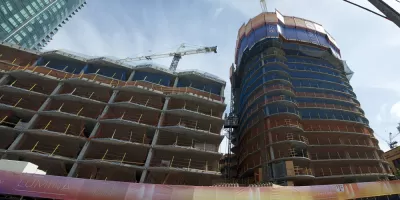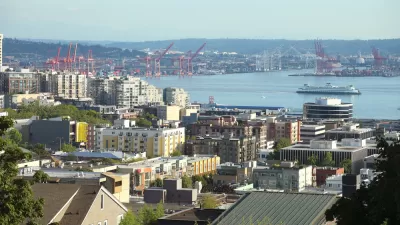While strict, suburban-style regulations often get a bad rap for the lack of housing in high demand cities, the red tape and other obstacles that delay development could be the worst culprit.

Dan Bertolet examines "one of the most important but overlooked causes of housing shortage: delay."
“Time is money,” goes the saying, and it’s the cardinal truth in the business of building homes. When a city’s regulations stretch the time from blueprint to move-in, the homes end up more expensive. Or they end up never built, because the delay makes them money-losers. In cities already suffering from a shortage of homes, either way, delay sends prices even higher.
Bertolet calls on existing research put a dollar figure to the cost of project approval delays in cities like Austin, San Francisco, and Seattle. In the latter's example, for a 135-unit apartment complex, "a two-month time reduction converts into a savings of $4,000 per unit."
Bertolet's analysis also digs into the issue of uncertainty, which is supposed to be a primary goal planning departments and land use regulations. Among examples of cities attempting to shorten time and increase certainty for development, Bertolet discusses the city of Portland's 2017 "Strategies for Accelerating Development," and the city of Seattle's expected changes to its design review process.
FULL STORY: HOUSING DELAYED IS HOUSING DENIED

Planetizen Federal Action Tracker
A weekly monitor of how Trump’s orders and actions are impacting planners and planning in America.

San Francisco's School District Spent $105M To Build Affordable Housing for Teachers — And That's Just the Beginning
SFUSD joins a growing list of school districts using their land holdings to address housing affordability challenges faced by their own employees.

The Tiny, Adorable $7,000 Car Turning Japan Onto EVs
The single seat Mibot charges from a regular plug as quickly as an iPad, and is about half the price of an average EV.

Seattle's Plan for Adopting Driverless Cars
Equity, safety, accessibility and affordability are front of mind as the city prepares for robotaxis and other autonomous vehicles.

As Trump Phases Out FEMA, Is It Time to Flee the Floodplains?
With less federal funding available for disaster relief efforts, the need to relocate at-risk communities is more urgent than ever.

With Protected Lanes, 460% More People Commute by Bike
For those needing more ammo, more data proving what we already knew is here.
Urban Design for Planners 1: Software Tools
This six-course series explores essential urban design concepts using open source software and equips planners with the tools they need to participate fully in the urban design process.
Planning for Universal Design
Learn the tools for implementing Universal Design in planning regulations.
Smith Gee Studio
City of Charlotte
City of Camden Redevelopment Agency
City of Astoria
Transportation Research & Education Center (TREC) at Portland State University
US High Speed Rail Association
City of Camden Redevelopment Agency
Municipality of Princeton (NJ)





























